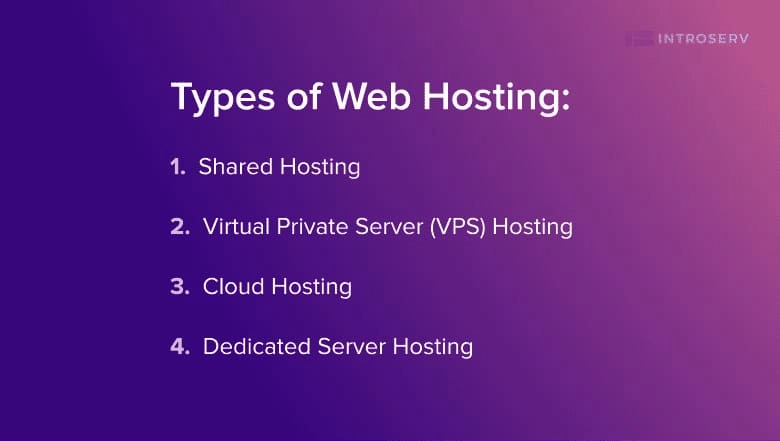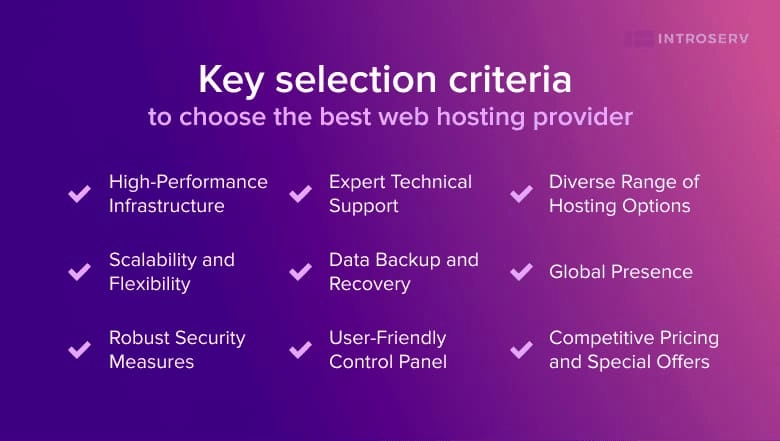
What is Web Hosting for Large Projects?
Welcome to our all-encompassing manual on web hosting for large projects! In today's digital era, it plays a pivotal role in ensuring the success of large-scale endeavors. Whether you're overseeing an enterprise website, managing an e-commerce platform, or developing a high-traffic application, understanding the intricacies of web hosting is of utmost importance. In this article, we will explain the essence of hosting, explore specific considerations for hosting extensive projects, and highlight a list of factors that will help you choose the right hosting solution.
What is Web Hosting?
Web hosting can be likened to leasing a parcel of land in the digital landscape, where you can construct your website or establish your web application. Just as a physical location is necessary to set up a brick-and-mortar store, web hosting provides a virtual space to store all the files, databases, and components that constitute your website.
Imagine this: your website is a collection of files encompassing HTML, CSS, JavaScript, images, videos, and more. These files require a dwelling, and that's precisely where web hosting comes into play. It furnishes you with the essential infrastructure, such as servers and data centers, to store and deliver your website's content to visitors.
Web hosting service providers are the entities that offer these hosting solutions. They maintain robust servers, often housed in specialized data centers, engineered to handle substantial volumes of traffic and ensure optimal performance. When you enlist the services of a web hosting provider, they assign a portion of their server space to accommodate the files that constitute your website.
Without web hosting, your website would remain confined to your local computer, accessible solely to you. By harnessing the capabilities of web hosting services, your website becomes accessible to anyone with an internet connection. This enables you to reach a global audience and drive engagement and conversions for your large project.
How Does Web Hosting Work?
The web host's server, a dedicated physical computer, operates ceaselessly to ensure your website remains available to visitors at all times. By procuring server resources from a web hosting provider, you can store your website's data on its servers.
When a user inputs your domain name into their browser's address bar, the web host's server takes charge of transmitting the necessary files to load your website. This process entails fetching images, videos, text, and other content from the server and delivering them to the user's device.
While it is feasible to self-host a website, it demands extensive technical prowess. Self-hosting entails establishing and configuring a web server from scratch, which encompasses handling equipment, infrastructure, hardware, and software. Furthermore, the responsibility of ongoing maintenance falls squarely on your shoulders.
By opting for the services of a web hosting provider, you can ensure that your website operates optimally and adheres to robust security protocols. Additionally, a hosting provider simplifies the complexities associated with website management, including software installation and technical support.
Web hosting for large projects elevates this concept to new heights by tailoring solutions to the specific requirements of ambitious endeavors. Such projects typically grapple with high volumes of traffic, rely on resource-intensive applications, and demand heightened levels of security and performance.
Types of Web Hosting

When it comes to web hosting, there are several options available to cater to diverse needs and requirements. This section delves into the various types of web hosting, encompassing shared hosting, Virtual Private Server (VPS) hosting, cloud hosting, and dedicated server hosting. Each type possesses distinctive characteristics, advantages, limitations, and optimal use cases.
1. Shared Hosting
Shared hosting resembles the concept of having roommates for your website. In this arrangement, multiple websites coexist on a single server, sharing its essential resources such as CPU, RAM, and storage. It represents an affordable option, particularly suitable for beginners, small businesses, or websites with moderate traffic.
Benefits:
- Cost-effectiveness: Shared hosting plans present a budget-friendly choice, making them highly appealing for individuals embarking on their online journey.
- Simplified management: The hosting provider assumes responsibility for server maintenance and management, granting you the freedom to focus on your website.
- User-friendliness: Shared hosting often incorporates user-friendly control panels that streamline website management tasks.
Limitations:
- Limited resources: As resources are shared among multiple websites, those experiencing high traffic or possessing resource-intensive elements might encounter reduced performance.
- Restricted control: Sharing a server with other websites entails limited authority over server settings and configurations.
- Security risks: Vulnerabilities in one website have the potential to affect others on the same server, underscoring the importance of robust security measures.
Ideal use cases:
- Personal blogs
- Small business websites
- Portfolio websites
2. Virtual Private Server (VPS) Hosting
VPS hosting combines the affordability of shared hosting with the control and flexibility associated with dedicated servers. It involves partitioning a physical server into multiple virtual compartments, each functioning as an independent server. Every VPS instance possesses dedicated resources, offering superior performance and security compared to shared hosting.
Benefits:
- Enhanced performance: VPS hosting, with its dedicated resources, ensures heightened performance, faster loading times, and improved stability.
- Scalability: VPS plans often facilitate seamless resource scaling as your website grows, accommodating rising traffic and resource requirements.
- Root access: VPS hosting empowers you with greater control, enabling customization of server settings and installation of preferred software.
Limitations:
- Technical expertise required: Managing a VPS necessitates a higher level of technical proficiency compared to shared hosting.
- Higher cost: VPS hosting carries a steeper price tag due to the dedicated resources and increased control it offers.
Ideal use cases:
- Growing websites
- E-commerce platforms
- Web applications with medium to high traffic
3. Cloud Hosting
Cloud hosting utilizes the power of multiple interconnected servers, forming a virtual network. It provides flexibility, scalability, and reliability by distributing resources across various servers. With cloud hosting, your website's files and data reside on multiple servers, mitigating the risk of downtime and ensuring seamless performance.
Benefits:
- On-demand scalability: Cloud hosting empowers you to promptly scale your resources based on your website's requirements, guaranteeing optimal performance during traffic surges.
- High reliability: By hosting your website on multiple servers, cloud hosting enables seamless switching to an alternative server should one encounter issues, minimizing downtime.
- Pay-as-you-go pricing: Typically, cloud hosting operates on a pay-as-you-go model, allowing you to pay solely for the resources you utilize.
Limitations:
- Technical complexity: Cloud hosting may involve more intricate setup and configuration compared to shared hosting or VPS hosting.
- Cost considerations: While cloud hosting offers unparalleled flexibility, it can be pricier than shared hosting or traditional VPS hosting, particularly for websites with consistently high traffic.
Ideal use cases:
- High-traffic websites
- Web applications with variable traffic patterns
- Websites that require high availability and scalability
4. Dedicated Server Hosting:
Dedicated server hosting bestows ultimate power and control over your hosting environment. With dedicated hosting, an entire physical server is exclusively dedicated to your website or application, granting unparalleled performance, security, and customization options.
Benefits:
- Maximum performance: Dedicated servers offer dedicated resources, ensuring optimal performance even under heavy traffic loads.
- Enhanced security: Full control over security measures makes dedicated servers ideal for handling sensitive data.
- Complete customization: You have the freedom to customize the server's hardware, software, and configurations to align with your specific requirements.
Limitations:
- Higher cost: Dedicated server hosting typically carries a higher price tag than other hosting options due to exclusive resource utilization.
- Technical expertise required: Effective management and maintenance of a dedicated server necessitate advanced technical knowledge.
Ideal use cases:
- Large-scale enterprise websites
- Resource-intensive applications
- Websites with a high-security requirements
| Hosting Type | Shared Hosting | VPS Hosting | Cloud Hosting | Dedicated Server Hosting |
| Resource Sharing | Shared resources among websites | Dedicated resources within a virtual server | Shared resources from multiple servers | Dedicated resources exclusively for your use |
| Performance | Moderate performance | Improved performance | Scalable performance based on demand | High-performance and maximum control |
| Scalability | Limited scalability | Scalable resources | Highly scalable resources as needed | Limited scalability based on server capacity |
| Control | Limited control | More control over server configurations | Limited control over underlying infrastructure | Full control over server configurations |
| Customization | Limited customization options | Moderate customization options | Limited customization options | Extensive customization options |
| Security | Shared security risks | Enhanced security measures | Robust security protocols | High level of security and customization |
| Cost | Affordable pricing | Moderate pricing | Flexible pay-as-you-go pricing | Higher pricing due to dedicated resources |
| Ideal Use Cases | Personal blogs, small websites | Growing websites, medium-sized businesses | High-traffic websites, variable traffic patterns | Enterprise-level websites, resource-intensive applications |
Shared hosting entails the sharing of server resources among numerous websites, while dedicated server hosting grants exclusive access to a dedicated server for your specific project. Shared hosting has its limitations, including potential performance issues and restricted control over server configurations.
VPS hosting and dedicated server hosting offer greater control, performance, and customization capabilities. VPS hosting strikes a balance between shared hosting and dedicated servers by providing dedicated resources and increased control at a more affordable cost.
Dedicated server hosting delivers the highest level of performance, control, and security. With dedicated servers, you gain complete authority over customization, security measures, and resource allocation, resulting in optimized performance for your large-scale project.
How to Choose the Best Web Hosting Provider?
When choosing a web hosting provider, it is vital to consider a multitude of features that can significantly impact the success of your project. Here are the key selection criteria to bear in mind during your search for the best web hosting provider:
1. High-Performance Infrastructure: Seek a hosting provider that offers robust and powerful servers housed in reliable data centers situated across multiple locations. This ensures optimal speed and performance for your website or application.
2. Scalability and Flexibility: Your hosting provider should provide scalable solutions that can accommodate the growth of your project. Look for options that allow easy resource upgrades and capacity adjustments as your traffic and requirements expand.
3. Robust Security Measures: Safeguarding your data and ensuring the security of your website or application are of utmost importance. Find a hosting provider that offers comprehensive security features, such as DDoS protection, firewalls, and advanced security protocols.
4. Expert Technical Support: Reliable technical support is essential for a seamless hosting experience. Choose a provider that offers round-the-clock support from knowledgeable professionals who can promptly address any issues or concerns you may encounter.
5. Data Backup and Recovery: Data loss can have severe consequences for your project. Ensure your hosting provider offers reliable backup solutions, including automated backups and straightforward data recovery options.
6. User-Friendly Control Panel: Managing your hosting environment should be intuitive and straightforward. Look for a provider that offers a user-friendly control panel equipped with a wide range of features for effortless management of your domains, emails, and settings.
7. Diverse Range of Hosting Options: Your hosting requirements may evolve over time, so opt for a provider that offers a variety of hosting options. This includes shared hosting, VPS hosting, dedicated servers, and cloud hosting, allowing you to select the solution that best aligns with your project's needs.
8. Global Presence: Consider a hosting provider with a worldwide presence, providing data centers in multiple countries. This ensures minimized latency and enhanced accessibility for your international audience.
9. Competitive Pricing and Special Offers: Value for money is paramount, so compare pricing options and special offers from different providers. Look for transparent pricing structures that fit within your budget while delivering the necessary features and performance.

Supercharge Your Project with INTROSERV's Hosting Services
Discover the perfect hosting solution for your large project with INTROSERV. Our wide range of hosting services includes dedicated servers and virtual private servers (VPS) designed to elevate your project to new heights.
Dedicated Servers for Unmatched Performance: Benefit from our extensive selection of over 10,000 configurations and more than 100 tariffs. With data centers in 9 countries, you have the flexibility to choose a server that perfectly suits your needs. Enjoy enhanced control, reliability, and security while we take care of all technical support 24/7.
VPS for Quick Project Launch: Experience the flexibility and scalability of our VPS solutions. Customize your cloud server to fit your unique requirements and enjoy the reliability and performance of our certified data centers. Our expert support team is available around the clock to ensure a seamless experience.
Don't settle for anything less than the best. Contact us today and experience the difference of INTROSERV's hosting services. Our friendly and knowledgeable team is ready to assist you in choosing the right hosting solution and answering any questions you may have.








